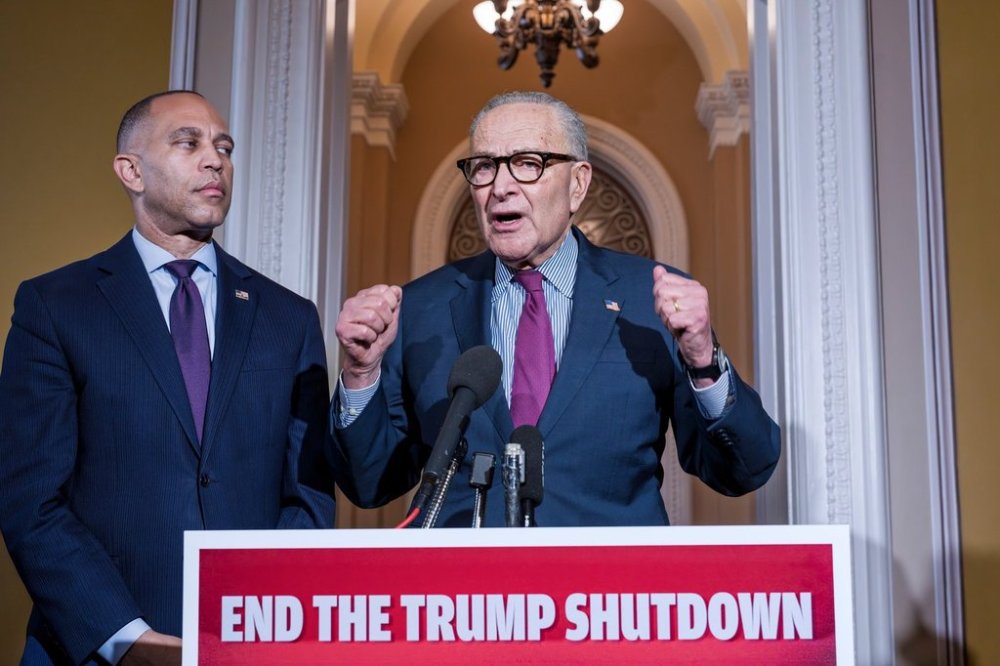World
Trump Sidelines Negotiations as Shutdown Continues Unabated

In the midst of a government shutdown that has persisted for three weeks, President Donald Trump shows little inclination to engage in negotiations aimed at resolving the deadlock. As discussions stall, Democrats assert that no meaningful progress can occur without Trump’s direct involvement. The current impasse has left Congress at a standstill, with the House of Representatives inactive for nearly a month.
Republican leaders have stated they will not negotiate until a short-term funding bill is passed to reopen the government. Conversely, Democrats are demanding guarantees on extending health insurance subsidies as a condition for their agreement. For now, Trump appears content to remain on the sidelines, diverting his attention to other matters, including a recent Israel-Hamas ceasefire deal he facilitated and a remembrance event for conservative activist Charlie Kirk.
The administration’s unconventional handling of the shutdown includes continuing to pay military personnel while laying off other federal employees. When asked if he would leverage his negotiation skills to resolve the shutdown, Trump indicated a lack of interest, stating, “We just want to extend, live with the deal they had.” He further dismissed Democratic demands regarding healthcare as “crazy.”
Karoline Leavitt, a spokesperson for Trump, emphasized that Democrats must first vote to reopen the government before serious discussions about healthcare can take place. Senate Majority Leader John Thune supported this position, asserting that Trump would be willing to engage with Democrats once the government is reopened.
Despite this, frustration is beginning to emerge among some members of Trump’s own party. Senator Lisa Murkowski of Alaska acknowledged that progress is stalling and stressed that Trump’s involvement is crucial for moving forward. She noted that some individuals within Trump’s administration may prefer the current congressional paralysis, which is not conducive to effective governance.
While Congress grapples with the shutdown, Trump has actively pursued his vision for the federal government. His budget chief, Russ Vought, has been labeled the “grim reaper” and has taken actions to withhold billions of dollars in infrastructure funding while laying off thousands of federal workers. These moves have drawn legal scrutiny, with a federal judge recently blocking the administration from firing workers during the shutdown, deeming the cuts politically motivated.
The shutdown has not yet significantly impacted public opinion. An AP-NORC poll released on March 15, 2024, indicated that 30% of U.S. adults viewed the Democratic Party favorably, while 40% expressed a favorable opinion of the Republican Party.
Democrats, including Senate Minority Leader Chuck Schumer and House Democratic Leader Hakeem Jeffries, criticized Republicans for their lack of seriousness in negotiations. Schumer remarked that no proposals have been presented by Republican leaders. Frustrated with this inaction, Democrats are increasingly looking to Trump to break the stalemate. During a recent CNN town hall, Representative Alexandria Ocasio-Cortez and Senator Bernie Sanders both called for the president’s direct participation in the negotiations, highlighting the necessity of his involvement for progress.
The Democrats’ focus on Trump reflects both his leadership style and the reality that any funding bill requires his signature to become law. However, Republican leaders controlling the House and Senate are resisting calls for Trump to intervene, arguing that he should not negotiate under conditions where Democrats hold the American public “hostage.”
A senior White House official, who spoke on the condition of anonymity, stated that Trump does not plan to personally engage in negotiations with Democrats at this time. The official confirmed that the only stopgap funding bill Democrats can anticipate is the one currently proposed.
As the shutdown continues, tensions within Congress and the administration persist. The political landscape remains fraught, with both parties holding firm to their positions. Amidst the stalemate, it is clear that without Trump’s engagement, the path forward remains uncertain, leaving many concerned about the implications for governance and public welfare.
-

 Politics4 weeks ago
Politics4 weeks agoSecwepemc First Nation Seeks Aboriginal Title Over Kamloops Area
-

 World5 months ago
World5 months agoScientists Unearth Ancient Antarctic Ice to Unlock Climate Secrets
-

 Entertainment5 months ago
Entertainment5 months agoTrump and McCormick to Announce $70 Billion Energy Investments
-

 Science5 months ago
Science5 months agoFour Astronauts Return to Earth After International Space Station Mission
-

 Lifestyle5 months ago
Lifestyle5 months agoTransLink Launches Food Truck Program to Boost Revenue in Vancouver
-

 Technology3 months ago
Technology3 months agoApple Notes Enhances Functionality with Markdown Support in macOS 26
-

 Lifestyle3 months ago
Lifestyle3 months agoManitoba’s Burger Champion Shines Again Amid Dining Innovations
-

 Top Stories2 months ago
Top Stories2 months agoUrgent Update: Fatal Crash on Highway 99 Claims Life of Pitt Meadows Man
-

 Politics4 months ago
Politics4 months agoUkrainian Tennis Star Elina Svitolina Faces Death Threats Online
-

 Sports5 months ago
Sports5 months agoSearch Underway for Missing Hunter Amid Hokkaido Bear Emergency
-

 Politics5 months ago
Politics5 months agoCarney Engages First Nations Leaders at Development Law Summit
-

 Technology5 months ago
Technology5 months agoFrosthaven Launches Early Access on July 31, 2025





















